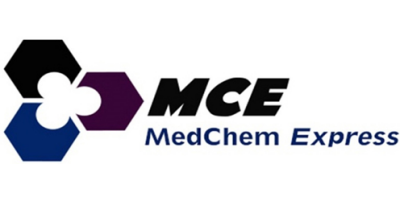

- Home
- Companies
- MedChemExpress LLC (MCE)
- Products
- MedChemExpress - Model alpha-Mangostin ...
MedChemExpress - Model alpha-Mangostin - 6147-11-1
alpha-Mangostin (α-Mangostin) is a dietary xanthone with broad biological activities, such as antioxidant, anti-allergic, antiviral, antibacterial, anti-inflammatory and anticancer effects. It is an inhibitor of mutant IDH1 (IDH1-R132H) with a Ki of 2.85 μM.MCE products for research use only. We do not sell to patients.
alpha-Mangostin
MCE China:alpha-Mangostin
Brand:MedChemExpress (MCE)
Cat. No.HY-N0328
CAS:6147-11-1
Synonyms:α-Mangostin
Purity:99.31%
Storage:Powder -20°C 3 years 4°C 2 years In solvent -80°C 2 years -20°C 1 year
Shipping:Room temperature in continental US; may vary elsewhere.
Description:alpha-Mangostin (α-Mangostin) is a dietary xanthone with broad biological activities, such as antioxidant, anti-allergic, antiviral, antibacterial, anti-inflammatory and anticancer effects. It is an inhibitor of mutant IDH1 (IDH1-R132H) with a Ki of 2.85 μM.
In Vitro:alpha-Mangostin (α-Mangostin) exhibits a selective inhibitory effect on IDH1-R132H, but not on IDH1. alpha-Mangostin (α-Mangostin) competitively inhibits the binding of alpha-mangostin (α-KG) to IDH1-R132H. The structure–relationship study reveals that alpha-Mangostin (α-Mangostin) exhibits the strongest core inhibitor structure. alpha-Mangostin (α-Mangostin) selectively promotes demethylation of 5-methylcytosine (5mC) and histone H3 trimethylated lysine residues in IDH1 (+/R132H) MCF10A cells[1]. Cell proliferation significantly decreases in a dose-dependent manner in the cells treated with alpha-mangostin. Alpha-mangostin also increases the levels of Bax (pro-apoptotic), cleaved caspase-3, cleaved caspase-9 and cleaved-poly(ADP-ribose) polymerase (PARP)[2]. alpha-Mangostin (α-Mangostin) significantly inhibits light-induced degeneration of photoreceptors and 200 μM H2O2-induced apoptosis of RPE cells. 200 μM H2O2-induced generation of reactive oxygen species (ROS) and light-induced generation of malondialdehyde (MDA) are suppressed by alpha-Mangostin (α-Mangostin)[3].
In Vivo:alpha-Mangostin (α-Mangostin) reduces risk of liver fibrosis through the decrease in p53 expression as compared to the TAA_DMSO treatment. The serum levels of the liver enzymes AST and ALT after treatment with α-mangostin decrease as compared to DMSO alone[4].
Animal Administration:Rats: Male Wistar rats are divided into 3 groups and treated with intraperitoneal injections of TAA (200 mg/kg). One subgroup is left untreated whereas the other two are treated either with 100 mg/kg alpha-mangostin or vehicle alone (80% DMSO, 20% water), which are administered intraperitoneally 3 times per weekfor a total of4 weeks. The incidence offibrotic nodules on the liver and the serum levels of the liver enzymes aspartate transaminase (AST) and alanine transaminase (ALT) are measured[4].
Cell Assay:IDH1+/+ and IDH1 MCF10A cells are grown in DMEM/F-12 media, supplemented with 5% horse serum, 20 ng/mL EGF, 0.5 μg/mL hydrocortisone, 10 μg/mL insulin. IDH1+/+ and IDH1 MCF10A cells are seeded in 6 well plates. After an exposure to 5 μM alpha-mangostin. cells are collected after indicated times and the viable cell number is calculated, using hemacytometer counting[1].
IC50 & Target:IC50: 2.85 μM (IDH1-R132H)[1] Cellular Effect Cell Line Type Value Description References
Hot selling product:Pyrithione | 2-Hydroxybutyric acid | L-Glutamic acid | Trimethylamine N-oxide | Ociperlimab | Procyanidin B2 | IPR-803 | Micafungin (sodium) | DCLK1-IN-1 | Vitamin D11
Trending products:Recombinant Proteins | Bioactive Screening Libraries | Natural Products | Fluorescent Dye | PROTAC | Isotope-Labeled Compounds | Oligonucleotides
References:
[1]. Kim HJ, et al. Discovery of α-mangostin as a novel competitive inhibitor against mutant isocitrate dehydrogenase-1. Bioorg Med Chem Lett. 2015 Dec 1;25(23):5625-31. [Content Brief]
[2]. Lee HN, et al. Antitumor and apoptosis-inducing effects of α-mangostin extracted from the pericarp of the mangosteen fruit (Garcinia mangostana L.) in YD-15 tongue mucoepidermoid carcinoma cells. Int J Mol Med. 2016 Apr;37(4):939-48. [Content Brief]
Brand introduction:
• MCE (MedChemExpress) has a global exclusive compound library of more than 200 kinds, and we are committed to providing the most comprehensive range of high-quality small molecule active compounds for scientific research customers around the world;
• More than 50,000 highly selective inhibitors and agonists are involved in various popular signaling pathways and disease areas;
• The products cover a variety of recombinant proteins, peptides, commonly used kits, more PROTAC, ADC and other characteristic products, widely used in new drug research and development, life science and other scientific research projects;
• Provide virtual screening, ion channel screening, metabolomics analysis detection analysis, drug screening and other professional technical services;
• It has a professional experimental center and strict quality control and verification system;
• Provide LC/MS, NMR, HPLC, chiral analysis, elemental analysis and other quality inspection reports to ensure the high purity and high quality of products;
• The biological activity of the products has been verified by the experiments of customers in various countries;
• A variety of top journals such as Nature, Cell, Science and pharmaceutical patents have included the scientific research results of MCE customers;
• Our professional team tracks the latest pharmaceutical and life science research and provides you with the latest active compounds in the world;
• It has established long-term cooperation with the world's major pharmaceutical companies and well-known scientific research institutions。
